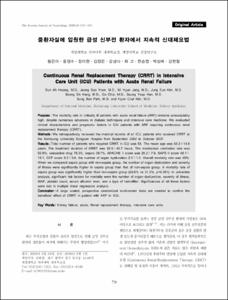KUMEL Repository
1. Journal Papers (연구논문)
1. School of Medicine (의과대학)
Dept. of Internal Medicine (내과학)
중환자실에 입원한 급성 신부전 환자에서 지속적 신대체요법
- Keimyung Author(s)
- Hwang, Eun Ah; Kang, Seong Sik; Han, Seung Yeup; Park, Sung Bae; Kim, Hyun Chul
- Journal Title
- Korean Journal of Nephrology
- Issued Date
- 2009
- Volume
- 28
- Issue
- 6
- Abstract
- Purpose: The mortality rate in critically ill patients with acute renal failure (ARF) remains unacceptably high, despite numerous advances in dialysis techniques and intensive care medicine. We evaluated clinical characteristics and prognostic factors in ICU patients with ARF requiring continuous renal replacement therapy (CRRT). Methods: We retrospectively reviewed the medical records of all ICU patients who received CRRT at the Keimyung University Dongsan Hospital from September 2002 to October 2007. Results: Total number of patients who required CRRT in ICU was 58. The mean age was 58.3±14.8 years. The treatment duration of CRRT was 63.5±40.7 hours. The mechanical ventilation rate was 82.8%, vasoactive drug 79.3%, sepsis 39.7%. APACHE II score was 25.2±7.9, SAPS II score 48.1±15.1, CCF score 9.3±3.6, the number of organ dysfunction 2.1±1.3. Overall mortality rate was 48%. When we compared sepsis group with non-sepsis group, the number of organ dysfunction and severity of illness were significantly higher in sepsis group than that of non-sepsis group. A mortality rate of sepsis group was significantly higher than non-sepsis group (82.6% vs 31.3%, p<0.001). In univariate analysis, significant risk factors for mortality were the number of organ dysfunction, severity of illness, MAP, platelet count, serum albumin level, and a type of hemofilter. Significances of all these factors were lost in multiple linear regression analysis. Conclusion: A large scaled, prospective randomized multi-center trials are needed to confirm the beneficial effect of CRRT in patient with ARF in ICU. Key Words: Kidney failure, acute, Renal replacement therapy, Intensive care units
목적: 최근 투석요법과 중환자 관리의 발전으로 인해 급성신부전 환자의 생존율이 괄목할 정도로 향상되었으나 신대체 치료를 필요로 하는 중증 급성 신부전 환자의 사망률은 여전히 높은 실정이다. 본 연구에서는 계명의대 동산병원에서 중증 급성신부전으로 지속적 신대체 치료 (CRRT)를 시행한 환자들의 임상적 특성 및 예후인자를 분석하고자 하였다. 방법: 2002년 9월부터 2007년 10월까지 계명의대 동산병원에 입원한 중환자 가운데서 적어도 24시간 동안 CRRT를 시행하였던 성인 환자를 대상으로 이들 환자의 임상적 특성, 기저 질환, 질병의 중증도 및 생존율, 예후 인자를 후향적으로 조사하였다. 결과: 총 58명의 환자가 연구에 포함되었으며 평균 연령은 58.3±14.8 (최소 17세, 최고 85세)세, 남녀 비는 2.2:1 이었다. CRRT 당시 인공호흡기 치료를 받고 있는 환자는 48예(82.8%), 승압제를 투여받고 있는 환자는 46예 (79.3%), 패혈증이 동반된 환자는 23예 (39.7%)였다. CRRT 시행 당시 질병의 중증도는 APACHE II score는 평균 25.2±7.9점, SAPS II score는 평균 48.1±15.1점, CCF score는 평균 9.3±3.6점이었으며 장기부전 수는 평균 2.1±1.3개였다. 대부분의 환자가 CVVHDF 치료를 받았으며 CRRT의 평균 치료시간은 63.5±40.7시간 (최단 24, 최장 179시간) 이었다. 전체 환자 생존율은 48.3%였으며 패혈증이 동반된 환자의 30일생존율은 34.8%로 비 패혈증 환자군의 30일 생존율 80.2%에 비해 유의하게 낮았다 (p<0.000). 또한 패혈증이 동반된 환자는 비 패혈증 환자에 비해 장기부전 수, 질병의 중증도가 유의하게 높았고, 혈청 알부민 치는 유의하게 낮았다. 환자 사망의 위험인자에 대한 단변량 분석에서는 기능부전 장기 수, 질병 중증도 점수, 평균 동맥압, 혈소판 수치, 혈청 알부민 치, 여과막 표면적이 유의한 위험인자였으나 다변량 분석에서는 모두 통계적인 차이를 보이지 않았다. 결론: 투석 치료를 요하는 중독한 급성 신부전 환자에서 CRRT의 효과를 판정하기 위해서는 치료 개시 시기, 한외 여과량, 치료방법 등을 포함한 대규모의 환자를 대상으로 한 잘 대조된 다기관 연구가 필요할 것으로 생각된다.
- Alternative Title
- Continuous Renal Replacement Therapy (CRRT) in Intensive Care Unit (ICU) Patients with Acute Renal Failure
- Publisher
- School of Medicine
- Citation
- 황은아 et al. (2009). 중환자실에 입원한 급성 신부전 환자에서 지속적 신대체요법. Korean Journal of Nephrology, 28(6), 559–569.
- Type
- Article
- ISSN
- 1975-9460
- Appears in Collections:
- 1. School of Medicine (의과대학) > Dept. of Internal Medicine (내과학)
3. Research Institutues (연구소) > Kidney Institute (신장연구소)
- 파일 목록
-
-
Download
 oak-aaa-4705.pdf
기타 데이터 / 532.77 kB / Adobe PDF
oak-aaa-4705.pdf
기타 데이터 / 532.77 kB / Adobe PDF
-
Items in Repository are protected by copyright, with all rights reserved, unless otherwise indicated.